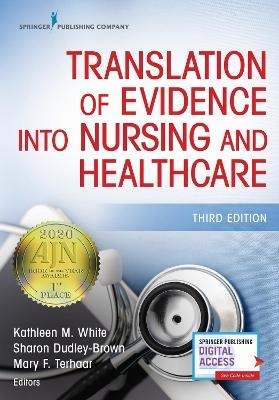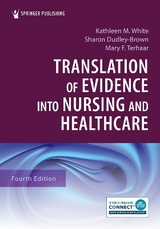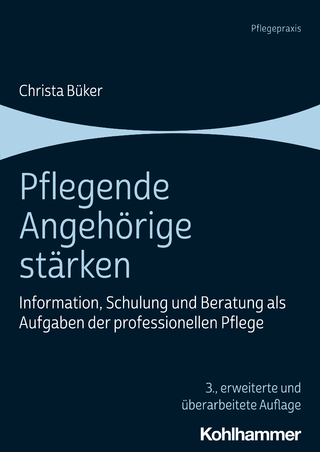
Translation of Evidence Into Nursing and Healthcare
Springer Publishing Co Inc (Verlag)
978-0-8261-4736-3 (ISBN)
- Titel erscheint in neuer Auflage
- Artikel merken
NAMED A DOODY’S CORE TITLE!
Designed as both a text for the DNP curriculum and a practical resource for seasoned health professionals, this acclaimed book demonstrates the importance of using an interprofessional approach to translating evidence into nursing and healthcare practice in both clinical and nonclinical environments. This third edition reflects the continuing evolution of translation frameworks by expanding the Methods and Process for Translation section and providing updated exemplars illustrating actual translation work in population health, specialty practice, and the healthcare delivery system. It incorporates important new information about legal and ethical issues, the institutional review process for quality improvement and research, and teamwork and building teams for translation. In addition, an unfolding case study on translation is threaded throughout the text.
Reorganized for greater ease of use, the third edition continues to deliver applicable theory and practical strategies to lead translation efforts and meet DNP core competency requirements. It features a variety of relevant change-management theories and presents strategies for improving healthcare outcomes and quality and safety. It also addresses the use of evidence to improve nursing education, discusses how to reduce the divide between researchers and policy makers, and describes the interprofessional collaboration imperative for our complex healthcare environment. Consistently woven throughout are themes of integration and application of knowledge into practice.
NEW TO THE THIRD EDITION:Expands the Methods and Process for Translation section
Provides updated exemplars illustrating translation work in population health, specialty practice, and the healthcare delivery system
Offers a new, more user-friendly format
Includes an entire new section, Enablers of Translation
Delivers expanded information on legal and ethical issues
Presents new chapter, Ethical Responsibilities of Translation of Evidence and Evaluation of Outcomes
Weaves an unfolding case study on translation throughout the text
KEY FEATURES:Delivers applicable theories and strategies that meet DNP core requirements
Presents a variety of relevant change-management theories
Offers strategies for improving outcomes and quality and safety
Addresses the use of evidence to improve nursing education
Discusses how to reduce the divide between researchers and policy makers
Supplies extensive lists of references, web links, and other resources to enhance learning
Purchase includes digital access for use on most mobile devices or computers
Kathleen (Kathi) M. White, PhD, RN, NEA-BC, FAAN, served as director of the MSN (Entry into Nursing), Doctor of Nursing Practice (DNP), and Master's programs at the Johns Hopkins School of Nursing and coordinated the MSN Health Systems Management Track and the MSN/MBA dual degree option. She continues to hold an adjunct faculty appointment at the Johns Hopkins School of Education, where she teaches in the Masters in Education for the Health Professions program, a collaboration of the Johns Hopkins Schools of Nursing, Medicine, Public Health, Business, and Education. Dr. White is recognized for her leadership in evidence-based practice. She was an original member of the School of Nursing/Johns Hopkins Hospital collaborative team that developed the widely published, award-winning Johns Hopkins Nursing Evidence-based Practice Model and Guidelines. Dr. White served as a senior adviser to the Center for Health Workforce Analysis, the Division of Nursing, and the Office of Performance Management in the Bureau of Health Professions at the Health Resources and Services Administration from 2010--2013. Her numerous practice leadership roles have included consulting with Parkway Group Healthcare in Singapore and the primary health care reform project in Armenia; as a member of the Hopkins-Healthways Advisory Group; as a member of the Maryland Health Care Commission's Hospital Performance Evaluation Guide Advisory Committee; as chairperson of the American Nursing Association Congress on Nursing Practice and Economics from 2006--2010; as the inaugural chairperson of the Maryland Patient Safety Center's Board of Directors; and as the chairperson of the Johns Hopkins Howard County Medical Center Board of Trustees from 2021--2023 (Board member, 2015--present). Sharon Dudley-Brown, PhD, RN, FNP-BC, FAAN, is a Professor at the University of Delaware. She also holds a faculty appointment at the Johns Hopkins University School of Medicine, where she sees patients as well as conducts research on patients with inflammatory bowel disease. Dr. Dudley-Brown has held several academic appointments, both nationally and internationally, and has worked as a nurse practitioner at several institutions over the past 25+ years. She has published numerous peer-reviewed papers and abstracts in the fields of nursing, inflammatory bowel disease, Crohn's disease, and ulcerative colitis, and is currently a member of several editorial boards, including that of Gastroenterology Nursing, where she is the international editor. She was instrumental in the formation of and is on the Board of Trustees of GHAPP: Gastroenterology and Hepatology Advanced Practice Providers, an organization dedicated to the education of APPs in gastroenterology and hepatology. Mary F. Terhaar, PhD, RN, ANEF, FAAN, is Associate Dean for Graduate Programs at the Fitzpatrick College of Nursing at Villanova University. She is a respected leader in translation, education, and team collaboration. Across 40 years of leadership spanning diverse systems, roles, and clinical services; she has framed problems as challenges, built high-functioning teams with diverse talents, and led development and execution of replicable solutions. Dr. Terhaar has authored or co-authored more than 70 manuscripts and chapters, as well as two broadly adopted texts on translation, evaluation, and DNP education. She is sought as a consultant on curriculum design and continuous improvement in nursing education and provides support to programs working to deliver high impact, rigorous education. She is an active site visitor and team leader for the Commission on Collegiate Nursing Education. Dr. Terhaar has advanced DNP education by creating processes, curricula, and resources which guide faculty and students across the nation and in five countries to produce outcomes. The pioneering work of teams she has led provides guidance for IRB submission, scholarly writing, data management, translation, multiple significant practice challenges, and now entry and success in doctoral education for nurses on the rise. All are increasingly included in curricula which prepare graduates to meet the Quadruple Aim. Dr. Terhaar has led a series of programs to increase diversity in the workforce by increasing diversity in graduate and undergraduate education. Most recently, she developed and lead an innovative program to increase diversity and belonging among undergraduate nursing students in collaboration with the Independence Blue Cross Foundation, and North Philadelphia high schools. Dr. Terhaar is co-founder of an innovative program that helps prospective students remove barriers to entering doctoral study, which has increased successful applications across diverse groups of nurses. She also developed a post-doctoral program for DNPs which increased dissemination, socialization, collaboration, and impact. She has helped to increase the caliber and rigor of scholarship produced by DNPs, appropriate submissions to IRBs, reliability of data and means testing, successful publications, and outcomes from DNP projects.
This book is dedicated to our students, who embrace the tremendous challenge of exploring the issues, weighing the evidence, and transforming practice.
It is essential that each and every one of us question the status quo, expect better ways to care, and collaborate always. Society demands better outcomes: Together, we have the ability and the responsibility to deliver.
Contents
Contributors
Preface
Acknowledgments
Introduction
PART I: TRANSLATION OF EVIDENCE
1. Evidence-Based Practice
2. The Science of Translation and Major Frameworks
3. Change Theory and Models: Framework for Translation
PART II: USE OF TRANSLATION
4. Translation of Evidence to Improve Clinical Outcomes
5. Translation of Evidence for Improving Safety and Quality
6. Translation of Evidence for Leadership
7. Translation of Evidence for Health Policy
PART III: METHODS AND PROCESS FOR TRANSLATION
8. Methods for Translation
9. Project Management for Translation
10. Ethical Responsibilities of Translation of Evidence and Evaluation of Outcomes
11. Data Management and Evaluation of Translation
12. Dissemination of Evidence
PART IV: ENABLERS OF TRANSLATION
13. Education: An Enabler of Translation
14. Information Technology: A Foundation for Translation
15. Interprofessional Collaboration and Teamwork for Translation
16. Creating a Culture That Promotes Translation
PART V: ISSUES IN TRANSLATION
17. Best Practices in Translation: Challenges and Barriers in Translation
18. Legal Issues in Translation
PART VI: TRANSLATION EXEMPLARS
19. Population Health Exemplars
20. Specialty Practice Exemplars
21. Healthcare System Exemplars
Index
| Erscheinungsdatum | 25.02.2019 |
|---|---|
| Verlagsort | New York |
| Sprache | englisch |
| Maße | 178 x 254 mm |
| Themenwelt | Pflege ► Studiengänge ► Pflegewissenschaft |
| ISBN-10 | 0-8261-4736-4 / 0826147364 |
| ISBN-13 | 978-0-8261-4736-3 / 9780826147363 |
| Zustand | Neuware |
| Informationen gemäß Produktsicherheitsverordnung (GPSR) | |
| Haben Sie eine Frage zum Produkt? |
aus dem Bereich



